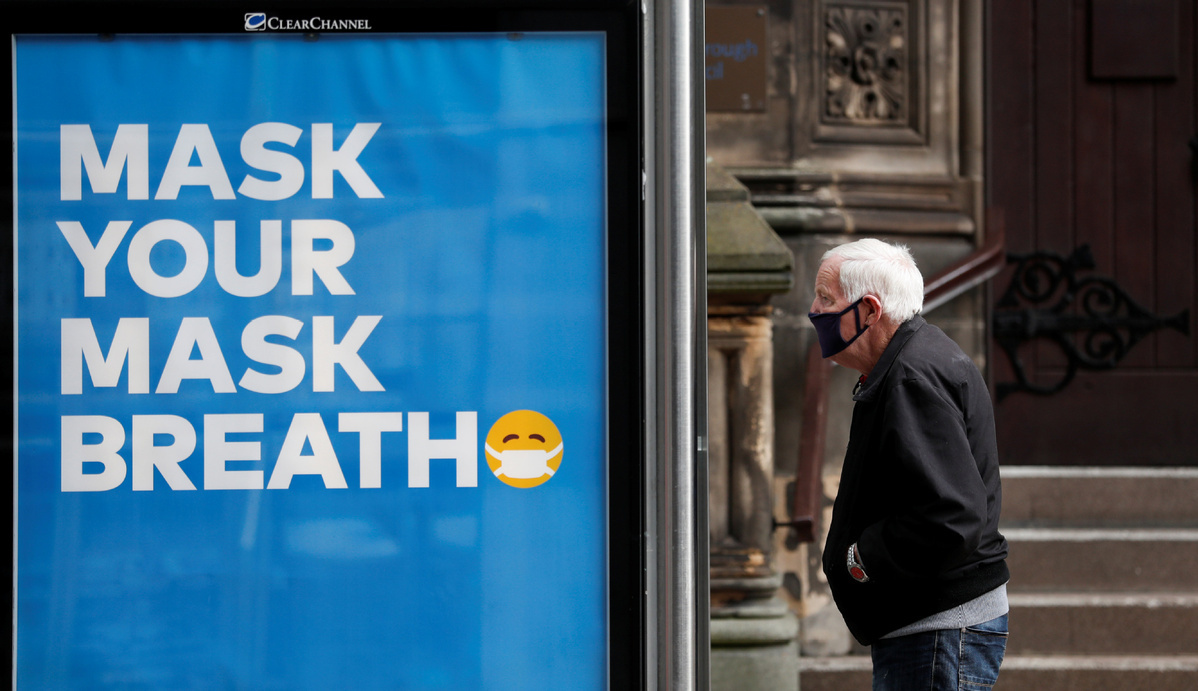
A man wearing a face mask stands next to a banner, amid the spread of the coronavirus disease (COVID-19), in Middleborough, on Oct 2, 2020. (Photo: Agencies)
Britain's Prime Minister Boris Johnson said on Sunday that a record-breaking spike in novel coronavirus cases across the nation was down to a "computing issue" that had been "rectified".
It comes after the United Kingdom government announced on Saturday that more than 12,000 new cases had been recorded for the first time since mass testing began.
The exact daily figure released was 12,872, while a further 49 people have died within 28 days of testing positive for COVID-19.
The government had previously noted that a technical issue meant some cases over the last seven days were not reported on the day they were recorded, and so these were instead included in Saturday's data.
Earlier data had suggested that cases may be rising more slowly than in previous weeks.
Speaking to the BBC's Andrew Marr, the prime minister said there had been a "failure in the counting system".
He also spoke about the impact of local lockdowns to control the virus, suggesting it is too early to say whether localized restrictions are working.
"We have to wait and see whether the rate of infection starts to come down," he said. Johnson acknowledged there was some public "fatigue" with limits placed on social and economic life and said he realized that people were "furious at me" and "furious at the government" amid continuing restrictions.
"I've got to tell you in all candour it's going to continue to be bumpy through to Christmas, it may even be bumpy beyond, but this is the only way to do it," he added.
He also rejected a suggestion he was suffering from long term effects of his previous COVID-19 infection. He said this was "total tittle tattle, it is drivel" adding, "it is balderdash and nonsense".
A scientific study has shown that people who have a certain gene inherited from Neanderthals are more likely to suffer severe forms of COVID-19.
The Associated Press reported that scientists from the Karolinska Institute in Sweden and the Max Plank Institute for Evolutionary Anthropology in Germany examined genes that have been linked to a higher risk of hospitalization and respiratory failure in patients infected with the novel coronavirus.
The researchers said the genes belong to a group, or haplotype, which likely came from Neanderthals. They said this haplotype is found in about 16 percent of the population in Europe and half the population in South Asia, while in Africa and East Asia it is non-existent.
They noted that the prevalence of the gene is highest in people from Bangladesh, where 63 percent are believed to carry it.
In Spain, which is experiencing the worst second wave in Europe, a new rapid antigen test has been rolled out. Health authorities in the country say the test gives results in 15 minutes, is more than 95 percent accurate in detecting COVID-19 infection, and costs less than $6.
The Guardian reported last week that 120 million antigen tests will soon be supplied to low and middle income nations across the world, as part of an initiative launched in March by the WHO, the European Commission, the Gates Foundation and the French government.
The newspaper said the tests could allow infectious people to be identified before they have symptoms and go into quarantine.
Germany's Chancellor Angela Merkel claimed last week that "quick and energetic" action by her government on the budget helped to cushion the nation from the economic blow of the pandemic.
In a debate on the proposed budget policy, Merkel told Bundestag lawmakers that extra debt the government would be taking on in 2021 was "the right thing" to do after extra lending of $112.6 billion was announced.
Merkel defended the policy that, if agreed by the Bundestag, would be the second-highest sum of new debt ever in modern German history.
Meanwhile, zoos are facing extinction as a result of the pandemic, with breeding programs to rescue rare species at risk due to lack of funding.
Without immediate government intervention, zoos will struggle to survive the winter, said the British and Irish Association of Zoos and Aquariums.
Kathryn England, London Zoo chief operating officer, told the BBC's Today program: 'We're all about conservation and preventing animals from going extinct so it's a really horrible place to be where we're actually worried ourselves about the reality of going extinct."


